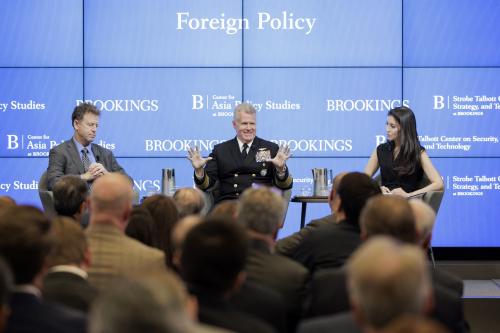On February 24, 2022, Russia launched a full-scale invasion of Ukraine. The war follows on Russian territorial aggression against its neighbor that began in 2014 with the illegal annexation of Crimea and a proxy war in the eastern Donbas region.
Tracking developments in the Ukraine war, the Brookings Institution — in partnership with The Washington Post — presents the Ukraine Index, which compiles security, economic, and political data presented in graphic form. Our purpose is to provide updated information on such key metrics as changes in the control of Ukrainian territory by the two sides, the amount of support for Ukraine from the U.S. and Europe as well the political support for continued aid, and the health of the Ukrainian economy. Our Ukraine Index is intended to contribute to our understanding of this conflict, and thereby to a more informed public debate.
We will update the index regularly and expand or amend the featured data as circumstances change. The data itself is taken from a variety of sources (government, international organizations, private). Since tracking data from the Ukraine war has been under dangerous circumstances in a war zone, it is of necessity approximative or incomplete.
Security
The war in Ukraine, now in its third year, remains an unpredictable conflict, yet the Ukrainian people’s unwavering bravery and resilience continue to inspire. Key battlefield trends — such as territorial control, drones and cruise missiles interceptions, and U.S. security assistance — reveal the ongoing dynamics of the conflict.
Economics
Ukraine’s economy has been hit hard by the Russian invasion and the need to divert productive capacity and labor to the war effort. The figures give a glimpse of the economic impact of the war as well as efforts to curb Russian oil revenue and global aid to Ukraine.
Politics & People
Russia has intentionally targeted civilian life and upended the lives of Ukrainian citizens, causing the largest displacement crisis in Europe since WWII. The international community has overwhelmingly condemned Russia’s unprovoked aggression, yet as the war drags on without an end in sight, support among publics and political leaders in many Western countries for high levels of aid to Ukraine is beginning to be questioned. The war’s effects on politics and people continue to be felt around the globe.
Additional resources
The following list compiles additional external resources that track and quantify various factors related to the war.
-
Bellingcat | Civilian Harm in Ukraine
Timeline and interactive map of attacks on Ukraine that resulted in civilian casualties and damage to civilian infrastructure. Most strikes are concentrated around areas of active fighting in Eastern Ukraine, but civilian harm has been recorded all across the country.
-
International Grains Council | Price Index
Interactive timeline of the Grains and Oilseeds Index. The Index spiked in the first months after Russia’s full-scale invasion but has since fallen again to around pre-invasion levels.
-
Chief Executive Leadership Institute | Company Departures from Russia
List of companies that have curtailed operations in Russia in the aftermath of its full-scale invasion into Ukraine, sortable by industry and country. While many companies have withdrawn from Russia completely, others continue full or limited operations, restricting the Russian economy and demonstrating global support for Ukraine.
-
Attacks on Health Ukraine | Health Infrastructure Damage
An interactive map that tracks the attacks on Ukrainian health care infrastructure and workers. While a majority of attacks occurred at the start of the war in Feb 2022, there are ongoing damages and injuries. The map accompanied by a report, emphasize the devastation of Ukraine’s health systems and Russia’s egregious violation of humanitarian law.
-
Institute for the Study of War | Map of Territory Control
An interactive map and static control-of-terrain maps of Ukraine updated daily. The invasion and stalemate continues to hold in Eastern Ukraine.
Acknowledgments:
- Data visualization team: Eric Abalahin, Nawal Atallah, Shavanthi Mendis, Rachel Slattery, Valerie Wirtschafter, Sharanya Majumder, and Sawyer Click
- Additional support: Natalie Britton, Ted Reinert, Sophia Winograd, and Ashton Bliss
We are grateful for any feedback and comments to improve the index; please send them to [email protected].








